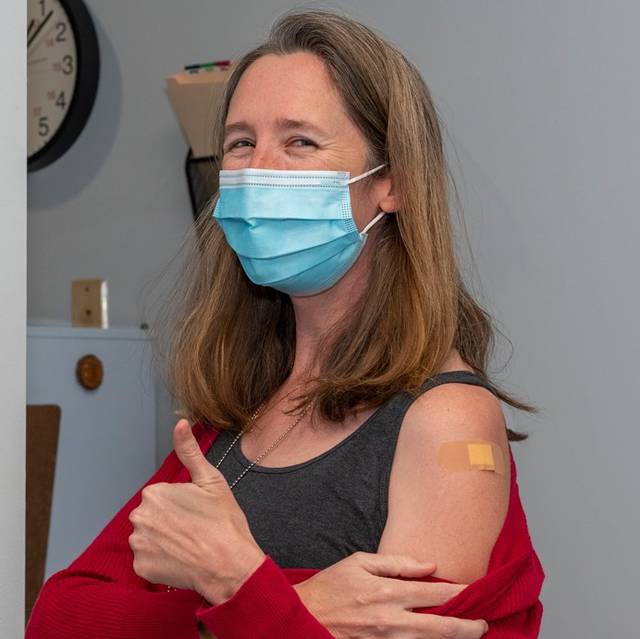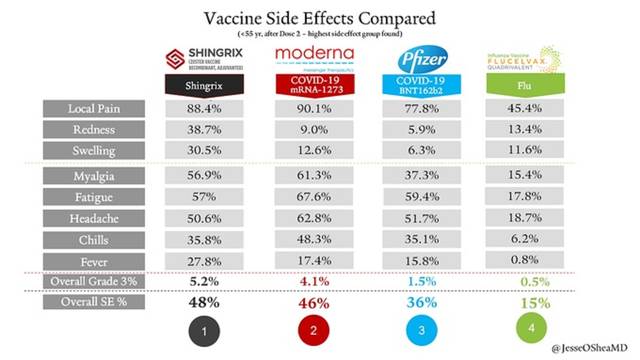
Daily Journal file photo
Dr. Gretchen Arnoczy after getting her first dose of the vaccine in December 2020.
ROCKINGHAM — As COVID-19 vaccines have become more widely available in Richmond County and residents have been getting the second, more effective dose, many people are experiencing side effects that range from localized pain at the site of the shot to a fever.
Dr. Gretchen Arnoczy, an infectious disease physician with FirstHealth of the Carolinas, explained that these symptoms, whether they be fatigue or muscle aches, should only last a day or two. It is “very rare” that any unpleasant symptoms, which are part of the body’s immune response that vaccines are meant to trigger, would persist beyond one or two days. If they continue beyond that, that’s when Arnoczy recommends you be evaluated by a doctor because it’s likely due to something else.
The Centers for Disease Control and Prevention released a study on Feb. 19 that asked vaccine recipients between Dec. 14, 2020 and Jan. 13 to report their post-vaccination experiences. Of the 13,794,904 doses administered, there were 6,994 reports of “adverse events” reported. Of those adverse events, 90.8% were classified as “non-serious” and the remaining 9.2% were classified as serious.
Out of those reported adverse events, 22.4% were for headaches, 16.5% for fatigue, and 16.5% were for dizziness. There were 113 deaths reported, but a review of the death certificates, autopsy reports, medical records and clinical descriptions from the reports from patients and health care providers did not suggest a causal relationship between the vaccine and the patient’s death, according to the CDC. There were also reports of acute allergic reactions at a rate of 4.5 out of every million doses administered.
A common method of avoiding these early side effects is for people to take Tylenol or ibuprofen ahead of time, but Arnoczy advices against this because it could “dampen your immune response to the vaccine.” Instead, she said it’s better to take medicine to treat those symptoms after they arise.
It takes about two weeks after the second dose for the vaccine to be fully in effect, according to Arnoczy. Some people were getting the virus in between their first and second doses, and within two weeks after their second dose, especially during the peak in January. She explained that the vaccines do not completely eliminate risk for COVID-19 infection, but they reduce the risk for severe cases more than any other form of treatment.
“It makes (COVID-19) a cold,” Arnoczy said of the vaccines.
Asked if getting both doses of the vaccine could result in patients having a “false sense of security” and engage in more risk-taking behavior, Arnoczy said that, thankfully, she hasn’t seen anyone hosting big parties and throwing away their masks or anything of that nature. Rather, she’s seen patients go out in public with more confidence than they’ve had since March 2020.
“(Patients two weeks after their second dose) will have some more sense of security, which I don’t think is a ‘false’ sense of security. I think that they do have some more sense that their risk of getting severe COVID and being hospitalized and dying from it is much less — and that’s true!” Arnoczy said. “I’m not recommending people throw their mask away and do whatever they want … I am seeing people, if they haven’t seen their grandma in a year and two weeks after their vaccine they feel good, they go see grandma.”
There is data to suggest that those who are vaccinated are also much less able to transmit the virus if exposed. Arnoczy cited a study out of Israel which found that out of 500,000 vaccinations, 500 people got COVID-19, but only four were hospitalized and none died — which she called “amazing data” because it shows that the vaccines are as effective as the early studies claimed they would be. Out of this study, they also found that the “viral load” of those who have been vaccinated and still catch the virus is much lower, which suggests that they are “much less infectious” than non-vaccinated people, according to Arnoczy.
With the country reaching the benchmark of 500,000 COVID-19-related deaths last week, Arnoczy looked back on how much experts knew at the time that turned out to be correct: outdoors is better than indoors, masks mitigate risk, and that previously unimaginable death tolls were possible if leaders did nothing. Early models predicted 2 million deaths in the United States if we continued like normal, and as low as 100,000 if major mitigation steps were taken.
“500,000 is just awful. It’s absolutely awful … It’s heartbreaking taking care of these patients,” she said. “It’s because it’s not just the deaths, but it’s also the grief and the families not being at the bedside. And how we die matters, right? I mean, saying goodbye in isolation is just heartbreaking.”
Hospitalizations finally dipped into the single digits in Richmond County last week, a major sign that things are turning around.
“Those of us who have been doing this work for the past year are very, very happy that our volumes (of patients) are so much better than they have been,” Arnoczy said. “The numbers have come down drastically over the past month and a half … and that’s been incredibly invigorating for everyone doing this work, the idea that we are hopefully turning a current corner.
“With vaccination and the decrease in cases, we’re seeing a ray of hope and we’re very hopeful that over the next few months, things will continue to get better,” she continued. “But in the meantime, the risk isn’t zero and people continue to get COVID. And so we want to continue practicing the three W’s of washing your hands, wearing a mask and waiting six feet apart.”
To support the Richmond County Daily Journal, subscribe at https://www.yourdailyjournal.com/subscribe.
Reach Gavin Stone at 910-817-2673 or [email protected].

